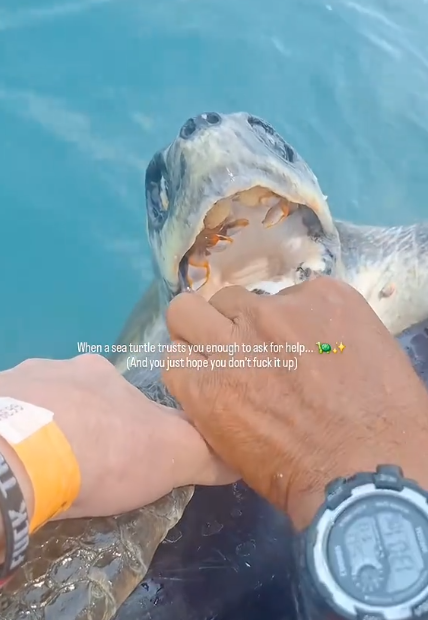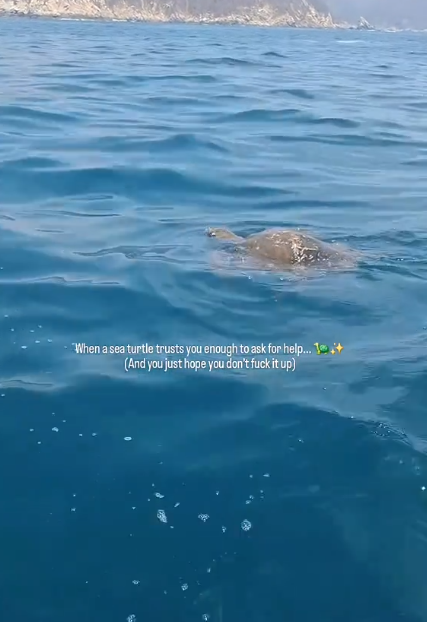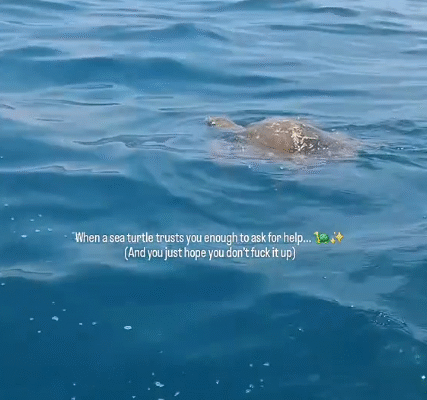
The sun was barely cresting the horizon when our small fishing boat rocked gently in the turquoise waters off Puerto Ángel, a sleepy fishing village on the southern coast of Oaxaca, Mexico. The ocean shimmered in that soft golden light that only exists in the first few minutes of morning. We weren’t even out for a rescue that day—just hoping to spot dolphins or maybe cast a line. But the sea, as it often does, had other plans.
“Look!” shouted Mateo, our captain, pointing a weathered finger toward the water just ahead. At first, I thought it was just driftwood bobbing along, but as we drew closer, the shape became clearer: a sea turtle, floating motionless, its shell thickly encrusted with barnacles and algae.
It wasn’t dead. I could see its flippers twitching ever so slightly. But it wasn’t moving away from us, either. It just hovered there, as if it had been waiting for us all along.
Barnacles aren’t just unsightly—they weigh turtles down, slow their swimming, and even make it harder for them to dive for food. For this one, the load was heavy. The poor creature’s back looked like it had been neglected for years.
The boat slowed, the engine dropping to a soft purr. “We can help it,” Mateo said, already grabbing his work gloves.
I leaned over the side, peering into the water. The turtle lifted its head just enough to take a small breath, its dark, liquid eyes locking onto mine. I don’t know how to explain it, but in that moment, I felt it knew we weren’t a threat. This wasn’t panic—it was something closer to trust.
I slipped into the water, the Pacific’s cool embrace wrapping around me. The turtle didn’t back away. It let me approach until I was right there beside it, my hands resting gently on its shell. I could feel the rough, uneven texture of the barnacles beneath my palms. They were thick, stubborn, and sharp in places.
“Hold it steady!” Mateo called from the boat, leaning over with a small scraping tool.
I positioned myself so the turtle’s head stayed above the surface when it needed air, my body braced against the soft push of the waves. Its flippers moved once or twice, but never in panic. If anything, it seemed to relax more with each passing second, as if realizing the strange two-legged creature next to it was here to make things better.
Mateo worked quickly, chipping away at the hardened shells that clung to the turtle’s carapace. Each barnacle popped off with a sharp crack, revealing the smooth green-brown shell beneath. Tiny fragments floated away like bits of broken porcelain.
Every so often, the turtle would take a deep, steady breath, filling its lungs with air before lowering its head again. And each time it breathed, it didn’t thrash or flinch—it stayed right there with me, letting us help. I couldn’t help but think of it like a “trust fall” in the middle of the ocean. This animal was vulnerable, and it had chosen to put that vulnerability in our hands.
We worked for nearly twenty minutes, removing not just barnacles but tangles of algae and small shells that had glued themselves in place over time. The closer we got to a clean shell, the lighter the turtle seemed to feel.
When the last barnacle fell away, Mateo stood back, wiping sweat from his brow despite the cool morning breeze. “There,” he said. “Better now.”
I loosened my hold and gently turned the turtle so it faced open water. For a moment, it didn’t move. It just hovered there, almost as if considering what had just happened. Then it lifted its head higher, took one long, deep breath that filled its chest, and in a single graceful motion, it dove beneath the surface.
The sunlight caught the smooth curve of its shell as it disappeared into the blue, leaving behind nothing but a trail of shimmering bubbles.

I floated there for a few seconds, the silence of the ocean pressing in around me. It was a strange feeling—part joy, part awe, part the ache of saying goodbye after sharing something unrepeatable. That turtle would never know my name, and I would never see it again, but for those minutes out there, we had been… well, something like friends.
Back on the boat, we watched the spot where it had vanished. Mateo gave a small nod. “Not every day you get to help like that,” he said quietly. “Nature trusts you once, maybe never again. You remember it for the rest of your life.”
And I knew he was right.
Even now, whenever I think about Puerto Ángel, it isn’t the fishing or the beach or even the sunsets I remember most—it’s that turtle. The weight of its shell beneath my hands. The unblinking calm in its eyes. The way it let us close enough to help.
A trust fall in the middle of the ocean, with nothing but water all around and a life that could have swum away at any second—but didn’t.
That moment, watching it disappear into the deep with its newfound freedom, wasn’t just priceless. It was a reminder that trust, once given, is one of the rarest and most beautiful gifts in the world.



